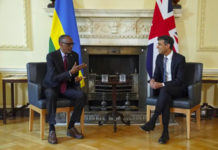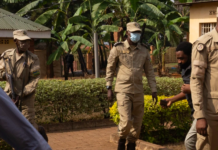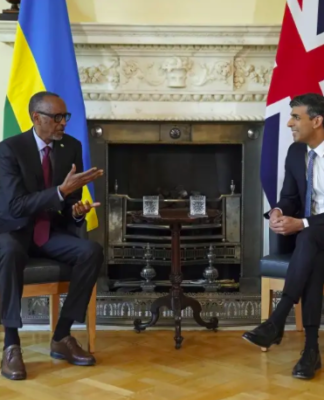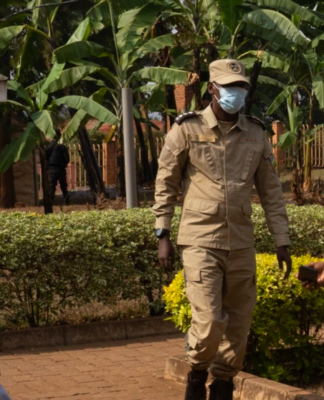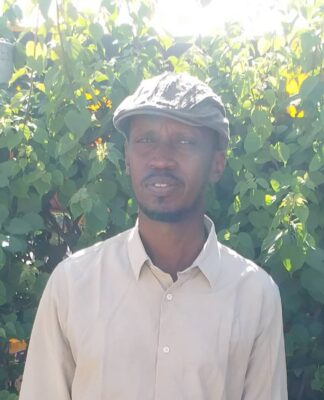Mr. Tony Hall,
Director-General of the BBC,
Broadcasting House,
Portland Place,
London, W1A 1AA
Dear Mr Hall
I am writing to you for 4 reasons : 1) to thank the BBC for its courageous stand to broadcast the documentary : Rwanda the Untold Story to allow all shades of opinion to be heard, however some may seem controversial, a hallmark of a democratic system and protection of the citizen against tyrannical rule 2) to appreciate the pressure that you will have to endure because you will have attacked very powerful interests in the academic, political and business circles who have thrived on the monopoly of their narrative and conceptual framework about the Rwandan conflict 3) to express my total dismay at experts who try to use a Rwandan national grief and tragedy, genocide against Tutsi, to protect the monopoly of being called experts on the Rwandan conflict 4) I shall make comments on the main charge sheet of the experts “scholars, scientists, researchers, journalists and historians (strange that no Rwandan is included in the list) against the BBC.
Thanks
I would like to express to you and through you to Jane and John, my sincere thanks for the most courageous undertaking to produce and broadcast the ground-breaking documentary, Rwanda’s Untold Story. It was high time to challenge the politically correct narrative imposed by the side that won the war in 1994 and its supporters.
I strongly believe that open discussion of the Rwandan conflict is in the best interest of both Rwandans and the British people and indeed of the international community as a whole. The interest of Rwandans is genuine national reconciliation and durable peace and development which are only possible when all voices are heard, even critical ones, when there is freedom of expression, when the rule of law does not discriminate for or against anyone. To paraphrase President Obama statement during his visit to Africa, African countries including Rwanda, need strong democratic institutions, not a strong leader particularly when a regime is legitimised by a flawed narrative.
One can safely say that peace in Rwanda, which has become the hotbed of instability in the Great Lakes Region, is also in the best interest of the British people, because peace would make it possible to unlock the economic potential of the Great Lakes Region and hence make possible mutually beneficial business exchange between Britain and the region rather than serving short term interests of international business mafia that is plundering the resources of the Congo.
It is in the best interest of the international community and of peace in the world even if we took into account the cost of maintaining one of the biggest peace keeping contingent in the world and the number of countries involved in conflicts of this region. So much resources, both financial and human are diverted from development to maintaining peace or to repair damages.
Open debate about the Rwandan conflict has been lacking up to now. as Lara Santoro and Susan Thomson rightly point out, due to one carefully protected narrative maintained through fear of being labelled genocide denier, revisionist, foreign governments and the public have been led to “support a government that claims to represent the victims of the genocide, without realizing that no alternative narrative has been allowed to emerge, creating a vacuum in which Rwandan citizens are now demonstrably at risk [1]There are no internal mechanisms in Rwanda to bridge this gap as observed in the 2011 report of the Centre for Strategic international studies (CSIS) commissioned by AFRICOM on future stability in Rwanda, “The National institutions of countervailing power i.e. independent legislature and judiciary, the media and politically active civil society groups- are very much constrained under RPF control and are thus unable to fulfil their potentially stabilising role as formal channels for national debate and peaceful political competition”.
The BBC documentary has helped to provide the space for debate to remove blinders that block a broader view of Rwanda, a pre-requisite for durable peace in Rwanda. As Marc Sommers observes ““Envisioning a radiant Rwanda is only possible if one shares the blinders that its government so confidently wears. The government of Paul Kagame boasts many excellent ideas. But underneath the splendid success are disturbing realities that are systematically contained. At least for now, Rwanda’s progress is dangerously uneven and so reliant on extreme levels of social and political control that its future is foreboding”[2]]. Some of the blinders are provided by expensive Public Relations Firms[3].
Lack of debate and maintaining a complacent attitude is dangerous for the future stability of Rwanda, as a research paper produced for the House of Commons on political trends in Rwanda points out “By indulging in wishful thinking, the international community is taking an enormous risk and assuming a grave responsibility. While it is understandable that the ‘genocide credit’ and the logic of ‘good guys and bad guys’ should have inspired a particular understanding of a regime born out of the genocide, this complacent attitude has incrementally, step by step, contributed to a situation that may well be irreversible and that contains seeds for massive new violence in the medium or long run Prof. F. Reyntjens African Affairs, Vol. 103, No. 411, April 2004, pp. 208-9[4].
I am so shocked that the learned signatories would wish to use the genocide card to protect their narrative on Rwanda at the expense of durable peace in Rwanda.
Pressure on the BBC
“A free press is the unsleeping guardian of every other right that free men prize; it is the most dangerous foe of tyranny. Where men have the habit of liberty, the Press will continue to be the vigilant guardian of the rights of the ordinary citizen”. Winston Churchill, 1949
I fully appreciate the pressure on BBC to discredit the programme and producers of the documentary. This is the daily experience of all Rwandans, who try to challenge government policies, try to speak out for democratic change, for the respect of human rights and for the rule of law.
You already know and would have known by now that the stakes are high from vested business and geopolitical interests who are keen to keep Rwanda as a role model for economic success story and an oasis of stability in a troubled region. The documentary is putting policy makers on the spot as taxpayers will want an explanation to why their money is used to fund a repressive regime responsible for the crimes described in the documentary. The documentary is also costly to scholars, historians or journalists whose moral authority as experts on Rwanda has depended on a narrative that they helped create or have used to receive various awards. All would be calling for heads to roll at the BBC. Luckily here in Great Britain the freedom of expression is guaranteed and the BBC is a strong institution that cannot be pushed around through blackmail. The situation is more precarious for individuals or Rwandan organisations who venture into expressing different opinions from the government narrative. They are immediately labelled and discredited either as “genocidaires”, criminals or thieves.
Total dismay
I was shocked that the eminent signatories would be convinced and be bold enough to make a blatantly false allegation that the BBC documentary denies genocide.
I was also horrified to see eminent men and women whose professions have thrived on the principle of a free press and right to information go out of their way to intimidate other people for holding views contrary to theirs. While I would understand the Public Relations Firms who are paid to polish the image of the Rwandan regime [5] it is hard to believe that “scholars and academicians” would be so biased. I have a strong feeling however that some of the signatories must have been drawn into it unknowingly and have no hidden agenda but genuine interest in helping the Rwandan people. I hope that with more scrutiny, they will realise the truth and be able to distance themselves from those who made them sign the letter.
What is more worrying Is how such learned men and women could come to such a level of self-confidence to think that they could take the world for a ride in accusing interviewees, Tutsi, who were part of the RPF that the signatories say stopped genocide as genocide deniers. This calls to mind another sad and ironic incident, when it was revealed that the person who led the protest of survivors in the UK against the BBC documentary turned out to be a person who was fired from SURF (Survival Fund UK) following allegations that he was an enlisted Hutu, whom the survivors alleged to have seen at road blocks in Kigali where Tutsis were being killed.
The Rwandan narrative
I have been following political development in the East and Central African region for the last 30 years, including 14 years in the Foreign Service as political analyst and would like to suggest what I believe to be a real political narrative for my country. My humble submission is that the cyclic brutal massacres that have bedevilled Rwanda are not a product of congenital brutal hatreds between Hutu and Tutsi. Ethnicities have only been used by political elites to mobilise political support around grievances of economic, social and political exclusion as well as human rights abuses. External powers have also played a big role in keeping repressive and dictatorial regimes in power and by implication playing a key role in creating conditions that have always led to political violence. External actors have not only included politicians and business mem but also historians, anthropologists; examples include those proposing pseudo-scientific theory linking physical features to intelligence as well as the Hamitic theory to explain existing political development in Rwanda. These theories were used to legitimise the monarchical exploitative regime thus exacerbating existing ethnic divisions between Tutsi- Hutu and Twa. The answer to the cyclic violence is the rule of law, equal opportunity, equitable justice and democracy that promotes peaceful competition for and exercise of power.
The learned men and women are not helping when they seem to encourage discrimination not only between the living victims but even among the dead. They do not seem to show any sympathy to the young Hutu girl in the documentary who recounts her painful memories of killings by the RPF soldiers; they are more interested in attacking her alleged wrong estimate of the number of interahamwe. They want to tell us that any research or debate suggesting a high number of Hutu victims would be negating genocide against the Tutsi. Yet they know or ought to know that genocide is not about numbers but the intention.
Comments on the charge sheet of the experts.
My comments are not about giving a thorough rebuttal against the sins that the learned men and women accuse the BBC of, but to give a bit of information that I have on some of the allegations to contribute in shedding some light on what happened in Rwanda.
Hiding the nature of the Hutu Power militia
The experts accuse the reporter of having produced a witness who underestimated the number of Hutu militia by giving a low estimate of interahamwe who were involved in killings, stating that 10% of interahamwe were involved in killings. The key issue for me as a Rwandan is that there should never have been even one single interahamwe or any other member of a militia, whatever the label may be, killing another one person because of his/her ethnicity. The people killed are not numbers but human beings and therefore, one dead is one too many. Balloting numbers to attack the BBC is shallow and insensitive.
Any person of good faith and humanity would have seen that the testimony of one Hutu lady who survived the RPF army killing, was to show that the violence was not the monopoly of one ethnic group; that the classification of Rwandans between bad and good guys is not best way to look at the Rwandan society and its tragic history. The matter is simple. There are Hutus as well as Tutsis who committed crimes and there are different categories of crimes including genocide. All perpetrators irrespective of ethnic affiliation must account for their crimes after due process of the law. The UN Commission of Experts’ preliminary and final reports (S/1994/1125 and S/1994/1405) on which basis the Security Council Resolution 955 set up the ICTR point out that: during the war that followed the assassination of President Habyarimana ” Individuals from both sides to the armed conflict in Rwanda during the period from 6 April 1994 to 15 July 1994 perpetrated serious breaches of international humanitarian law, in particular of obligations set forth in Article 3 common to the four Geneva Conventions and relating to the protection of victims of non-international armed conflicts of 8 June 1977 and that Individuals from both sides to the armed conflict perpetrated crimes against humanity.”
Attempt to minimize the number of Tutsi murdered in the genocide
The most serious charge presented is that the reporters “even claim that in 1994 more Hutu than Tutsi were murdered”. It is sad that the battle field about the Rwandan tragedy is reduced to the numbers of people who died. The signatories of the letter know very well that the central issue is not the numbers but the intention. They don’t seem to be prepared to acknowledge that some members of RPF killed a big number of Hutu, that some members of RPF committed crimes against humanity and hence provide a moral authority to the narrative of the current Kigali regime to intimidate the Hutu component of the population. The Hutu population fear to mourn their dead members during that tragic period to avoid being accused of the crime of genocide denial. Of course numbers matter but the current issue is not to know which component of the population lost most of its members but to acknowledge that all the Rwandans lost loved ones irrespective of how they died and the seriousness and nature of the crime committed by perpetrators. This task is for the courts.
But even if it was proven, by a commonly agreed independent commission of enquiry that more Hutu died than Tutsi, this would not remove the genocide committed against Tutsi. And if it was proven before a court that the crimes committed against the Hutu refugees in the Democratic Republic of Congo constituted genocide against the Hutu (UN Mapping Report 2010), this would not reduce the seriousness of the genocide committed against the Tutsi. The Mapping Report states that “the apparent systematic and widespread attacks described in this report reveal a number of inculpatory elements that, if proven before a competent court, could be characterized as crimes of genocide[6].
I lost brothers and relatives, some killed by the RPF and others by the government militia because, though Hutu, they looked Tutsi by their features. Telling my story or asking to know where their remains are should not be construed to mean that I am denying or minimising genocide. As far as I am concerned one innocent life lost is one life too many and that the crime of genocide should never again happen in Rwanda. We need to take seriously the words of Primo Levi that: “Justice like innocence belongs to individuals not groups. [7]Therefore until we acknowledge the pain of each Rwandan who lost a loved irrespective of ethnic affiliation there will never be genuine national reconciliation.”
The worst form of minimizing genocide to me is reducing the dead to sheer numbers instead of humans, to use genocide for political end or other interests, to try to bend the meaning of genocide denial to get rid of or silence someone with a different opinion, to accuse a young girl who is trying to recollect her bad past experience as minimising genocide.
I totally reject the binary conceptual framework (good and bad guys) that seem to underpin the storyline of the signatories of the letter or at least those who prepared the letter to the BBC. The language used in the letter of the signatories seems to me to reflect a deep seated conviction or belief that violence in Rwanda is caused by something innate within the Rwandan people who are likely to burst into savage slaughter at any time and therefore the need to use brutal force or dictatorial regime to keep them in check. President Paul Kagame has been a very good disciple of this school of thought because as the report of the “Centre for Strategic and International Studies” (2011): his leadership has demonstrated that it is “unable to manage political competition and popular demands without resorting to violence or coercion”[7]…It is quite revealing that in an interview to the semi-official Rwandan Newspaper paper “The New Times”, on the 14th of October this year one of the signatories , Andrew Wallis, blamed the West for trying to impose the western model of democracy on African leaders, and pointing out that the luxuries of the western democratic took hundreds of years for the British people to gain them. He expressed disaffection of how Rwanda and its leaders were being treated by the West on this matter. This contradicted the words pronounced by the special adviser to President Kagame, Hon Tony Blair when he addressed the US Congress in June 2003, while trying to justify Iraqi invasion to install democracy that: “Ours are not Western values. They are the universal values of the human spirit and anywhere, anytime, ordinary people are given the chance to choose, the choice is the same: Freedom not tyranny. Democracy not dictatorship. The rule of law not the rule of the secret police”. Andrew Wallis one of the signatories of the letter that attacked the BBC arrogantly implies that Rwandans need more hundred years to get access to the democratic luxury described by Tony Blair and should count themselves lucky to live the dictatorial and repressive regime of President of Kagame.
In this regard, there seems to be an underlying belief among the signatories that access to the democratic ways of open debate about genocide would let loose the demons and “embolden Hutu power and genocidaires” who could again erupt into barbarism against Tutsi. This narrative has emboldened the repressive regime and created the fear among the public that Hutu particularly of a certain age are real or potential genocidaire. It has also created a sense of collective guilt among a great section of the Rwandan Hutu community. I have met foreigners who were surprised that when they asked a Rwandan if he was Hutu or Tutsi, he or she would answer that he/she is both, or mention their new nationality. I have come to discover that such answers come from Hutu who fear to lie that they are Tutsi and at the same time fear to say they are Hutu because they are scared of being labelled as genocidaires or harbouring genocide ideology.
In this regard if one pushed the reasoning of the signatories ad absurdum with reference they made to one of the world’s preeminent genocide scholars, the US Professor Greg H. Stanton relating to the process leading to genocide, one could as well say that the signatories are involved in a process that could lead to future genocide against Hutu. One could now identify five out of the ten stages mentioned in the letter:
Step one: classification of the population = Hutu – Tutsi
Step two: symbolization of those classifications= bad guys = Hutu power; genocidaires, genocide deniers; harbouring genocidal ideology
Step three: discrimination against a targeted group= lack of equitable justice, discrimination of victims based on ethnicity
Step four; dehumanisation of the pariah group; genocidaires, genocide deniers therefore killers therefore exclusion from moral consideration, exclusion of Hutu from moral consideration.
Step five; polarisation of the population; political, social and economic exclusion
It is high time, for the sake of peace in Rwanda, to review the narrative of the learned scholars and academicians and stop its dissemination.
Effort to place the blame for shooting down President Habyarimana’s plane on April 6, 1994 on the Rwandan Patriotic Front (RPF).
I am not a ballistic expert nor would I wish to pre-empt the findings of the French Judge. However I do not see where the authors of the letter get the moral certainty about the perpetrator of the terrorist act of shooting down the aircraft, and how they can afford to recycle factual inaccuracies. I wonder why as academics and historians they would quickly condemn someone trying another line of enquiry; why would it be a taboo or an offence to think that the RPF could have shot down the plane. Why would they use the incomplete enquiry of the French magistrate Judge Marc Trévidic, to absolve the RPF? I would like to share however some information gained from my own research.
Shooting down of the plane.
In any investigation, the first question is: ”In whose interest has the crime committed?”
On the day that the plane was shot, the President had taken with him the Chief of Staff of the Army, the Head of the Presidential Protection Unit, the Minister of Internal Affairs, and the Minister of Foreign Relations Information. The Minister of Defence was out of the country and the Chief Military Intelligence, the Chief of Combat operations was also outside of the country. How could the alleged culprits have organised themselves to be absent or to be killed?
I also learnt that when the plane was shot the remaining top high ranking officers held a meeting to which General Dallaire, UN Military Commander (signatory of the letter to the BBC) was invited and attended. Dallaire testified that the atmosphere in the meeting room made it obvious that no-one had a clear plan of what should be done next. According to my witness who was at the meeting, General Dallaire was asked to meet the RPF and arrange a meeting to discuss how they could handle the situation. In addition a military delegation was sent to meet the UN Political representative Jacques-Roger Booh to discuss the political situation and seek his advice. According to my source General Dallaire was asked to provide escort to diplomats to a meeting to meet the military delegation for a briefing and advice. General Dallaire is alleged to have ignored the directive of his political boss and the meeting did not take place. The military officer appointed as chief of staff, was Colonel Marcel Gatsinzi who was said to be a moderate Hutu and who later joined the RPF when it took power. He became RPF chief of staff and later Minister of Defence These activities which followed the shooting of the presidential plane do not seem to indicate the existence of a group intent on seizing power.
Location of the missile that shot down the presidential plane
It is a misleading account by the experts that the ballistic report identified Kanombe Military barracks as the definite location from where missile were fired. The report identified the Kanombe military zone (domaine militaire) as one of the possible locations from where the missile could be launched. The Kanombe military barracks and the Kanombe military zone are two different things. The military zone is a very vast area with savannah forests, agricultural fields as well as the military barracks. The launching of the missile could be anywhere in that vast area far from the eyes of the military personnel living in Kanombe barracks.
It is also not true that Kanombe barracks is the most fortified barracks in the country. I have passed near the barracks in public transport to visit friends in the neighbourhood of the barracks. The fence is made by trees and barbed wire.
The offence of doubting that the RPF ended the genocide
Gen. Dallaire, commander of the UN forces in Rwandan (UNAMIR), testified under oath before the International Criminal Tribunal for Rwanda, that Gen. Paul Kagame told him that those civilian killings were“collateral damage” for his war plan. His Deputy Luc Marchal, former Deputy Commander of UN troops in Rwanda, testified at the ICTR on 2/12/2006: “From my experience, my conclusion is that the RPF (Rwandan Patriotic Front) “had one goal, seizing power by force and keeping it to themselves”, “For me, it is the Rwandan Patriotic Front which has perpetrated the attack (shooting the presidential aircraft). Not once, never have I sensed the desire to make concessions, to smooth rough edges, to reach a consensus”.
Impact assessment of the broadcast
With regard to the impact of the programme I wonder how and when the signatories carried out an impact assessment to reach the conclusion that “the programme has fuelled genocide denial and has further emboldened the génocidaires, all their supporters and those who collaborate with them”. It is quite clear that the signatories did not apply the standards of research that they would want BBC to abide by.
Conclusion
I would like to reiterate that no one should ever play down the heinous nature and monstrosity of the crime of genocide but picking it as a credit card and using it as a political tool to silence critics, commit other crimes or using it for other personal interests is a cynical and abhorrent betrayal to our dead. This is why some of us have decided to come out at the risk of our own lives, to fight such cynicism as a sign of homage to the loved who have left us; relatives, friends, Tutsi, Hutu and Twa and to build a reconciled Rwanda for our children, where every Rwandan will be judged by his/her character not by her ethnic or regional affiliation.
I concur with my compatriot Dr Theogene Rudasingwa who also wrote to you that “Rwandans will decisively and finally put these matters to rest as a society”. It is a war that we or our children must win and we will not be deterred by detractors, blackmail or death threats.
I would challenge the signatories of the letter to a conference organised by the BBC or any other organisation to further discuss this matter.
Yours sincerely
Justin Bahunga
London – UK
[1]Lara Santoro is a novelist who worked as a journalist in Rwanda from 1996 to 2004.; Susan Thomson is a professor of peace and conflict studies at Colgate University and the author of “Whispering Truth to Power: Everyday Resistance to Reconciliation in Post genocide Rwanda
[2]Marc Sommers, fellow at the Woodrow Wilson International Center for Scholars and the author of “Stuck: Rwandan Youth and the Struggle for Adulthood”
[3] http://www.racepointgroup.com/clients/Rwanda_case_study.cfm[3] Robert Booth: How London became the world capital of reputation laundering (Guardian 3 August 2010)
[4][4] quoted in the RESEARCH PAPER 06/51 25 OCTOBER 2006 for the House of Commons
[5]Blairite polish for tainted Rwanda :http://www.thesundaytimes.co.uk/sto/news/uk_news/National/article1202399.ece
[6]DRC: Mapping human rights violations 1993-2003: point 517
[7] Rwanda Assessing risks to stability by the Centre of Strategic and International Studies CSIS (2011). Commissioned by AFRICOM.

